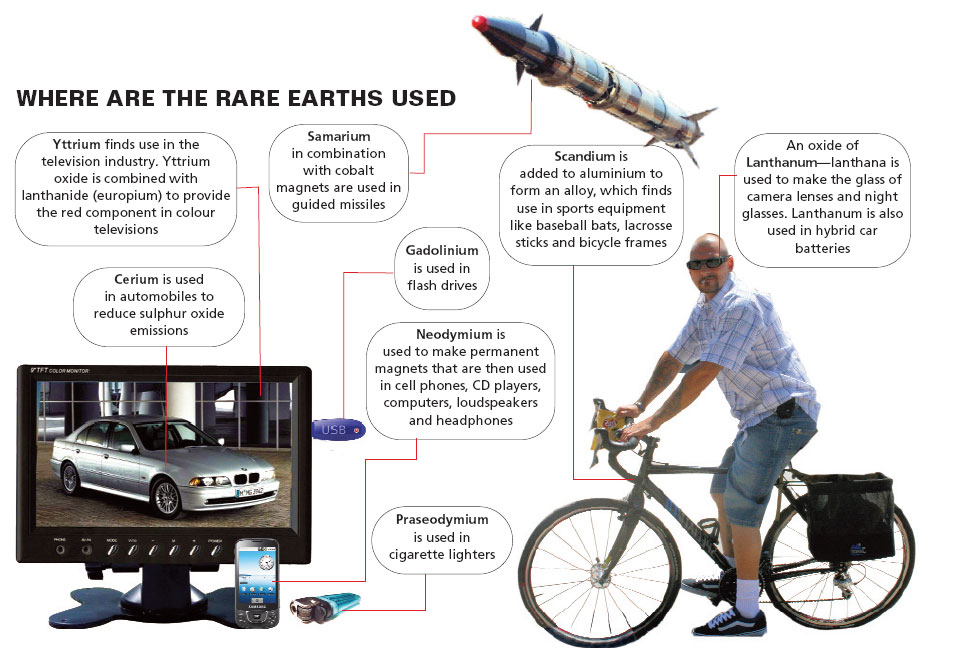Economy
China Bans Export of Rare Earth Technologies
- 25 Dec 2023
- 6 min read
For Prelims: China Bans Export of Rare Earth Technologies, Rare Earth Metals, Global supply chains, Periodic Table, Magnet production.
For Mains: China Bans Export of Rare Earth Technologies, Rare Earth Metals and the need to develop capabilities to increase its production in India.
Why in News?
Recently, China has banned the export of technology to extract and separate the Rare Earth Metals, as it overhauled a list of technologies deemed key to national security.
- It also banned the export of production technology for rare earth metals and alloy materials as well as technology to prepare some rare earth magnets.
- The move comes as Europe and the US scramble to wean themselves off rare earths from China, which accounts for 90% of global refined output.
What are Rare Earth Metals?
- They are a set of seventeen metallic elements. These include the fifteen lanthanides on the periodic table in addition to scandium and yttrium that show similar physical and chemical properties to the lanthanides.
- The 17 Rare Earths are cerium (Ce), dysprosium (Dy), erbium (Er), europium (Eu), gadolinium (Gd), holmium (Ho), lanthanum (La), lutetium (Lu), neodymium (Nd), praseodymium (Pr), promethium (Pm), samarium (Sm), scandium (Sc), terbium (Tb), thulium (Tm), ytterbium (Yb), and yttrium (Y).
- These minerals have unique magnetic, luminescent, and electrochemical properties and thus are used in many modern technologies, including consumer electronics, computers and networks, communications, health care, national defense, clean energy technologies etc.
- Even futuristic technologies need these REEs.
- For example, high-temperature superconductivity, safe storage and transport of hydrogen for a post-hydrocarbon economy etc.
- They are called 'rare earth' because earlier it was difficult to extract them from their oxides forms technologically.
- They occur in many minerals but typically in low concentrations to be refined in an economical manner.
What are the Global Implications of Banning Rare Earth Export Technology?
- Global Supply Chain Disruption:
- China is the world's top processor of rare earths. Given China's dominant role in rare earth production and processing, the ban could disrupt global supply chains for various industries reliant on these materials.
- Countries and industries heavily dependent on Chinese rare earth exports might face shortages or higher costs.
- Strategic Dependence:
- It underscores the vulnerability of countries heavily reliant on China for critical materials.
- Dependence on a single source for such essential elements raises concerns about supply security, pushing nations to explore alternative sources or domestic production.
- Opportunities for Innovation:
- The ban might spur innovation and investments in alternative technologies and supply sources outside China.
- Countries may seek to diversify their rare earth supply chains, reducing dependence on a single market.
How can it Impact India?
- Supply Chain Diversification:
- India, like many other countries, relies on Chinese rare earth exports. The ban presents an opportunity for India to reassess its dependence and explore diversification strategies.
- India may focus on developing domestic rare earth extraction and processing capabilities or seek partnerships with other nations to secure its supply.
- Industrial Impact:
- Industries in India relying on rare earth materials may face disruptions initially due to potential supply constraints.
- However, this could prompt investments in domestic production or collaborations with alternative suppliers to mitigate risks.
- The Rare Earth (RE) resources in India are reported to be the fifth largest in the world.
Way Forward
China's ban on rare earth technology exports highlights the criticality of diversifying global supply chains and the need for strategic planning by nations, including India, to secure essential resources for their industries and technological advancement.
UPSC Civil Services Examination, Previous Year Questions (PYQs)
Q. Recently, there has been a concern over the short supply of a group of elements called ‘rare earth metals. Why? (2012)
- China, which is the largest producer of these elements, has imposed some restrictions on their export.
- Other than China, Australia, Canada and Chile, these elements are not found in any country.
- Rare earth metals are essential for the manufacture of various kinds of electronic items and there is a growing demand for these elements.
Which of the statements given above is/are correct?
(a) 1 only
(b) 2 and 3 only
(c) 1 and 3 only
(d) 1, 2 and 3
Ans: (c)







